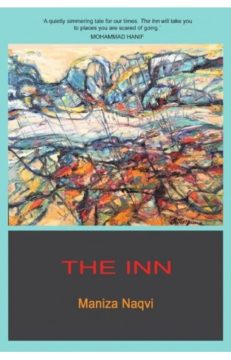by Claire Chambers

Maniza Naqvi’s new novel The Inn, published by Maktab-e-Danyal, is about that moment when summers of love and friendship begin a slow-motion nosedive into an autumn of sexual malice and drawn-out feuds. Sal, the novel’s protagonist, is a middle-aged radiologist originally from Pakistan. At the turn of the twenty-first century, he is living in Washington DC. There he spends much of his time holed up in a lab checking intimate X-rays of patients’ organs and body parts for tell-tale signs of disease. At other moments he is responsible for giving these patients and their relatives the worst possible news. A turning point comes when, first, he has to tell two young parents that their child is dying. Second, around the same time, a neighbour from the same apartment block as Sal dies a lonely death. This tenant’s body is only found because it starts to putrefy and the smell permeates other flats.
Sal, a workaholic and divorcee who has hitherto not had much time for reflection, is by dint of these two deaths confronted with his own life’s emptiness. He gains a heightened awareness of America’s loneliness epidemic and obsession with privacy, and becomes desperate to make his own life more meaningful. In a quest for the pastoral lifestyle and to meet new friends, he rents a room at the titular Inn in the Virginian countryside. The inn’s owners, Billy and Sylvia, make a show of welcoming him and introducing him to their friends and to other guests. Independently, Sal also meets Maribeth, a beautiful widow who lives nearby. He gradually falls in love with this woman from such a different background to his own, who is warm-heared despite seeming right-wing and far from sensitive in her manner of speaking. Naqvi boldly positions her ageing characters, both male and female, as attractive, desiring and desired. In this sunny environment, Sal seems to be finally putting down roots and making a home for himself in the United States.
 However, amid her bucolic setting Naqvi unfolds a storied and at times chilling set of entangled relationships and prejudices. As Mohammed Hanif sagely points out in his dust jacket blurb, The Inn, with its ‘quietly simmering’ prose, ‘will take you to places where you are scared of going’. The dark destination Hanif speaks of is the heart of American structural racism. Despite its nonlinear unspooling, the novel shows that 9/11 was a major turning point for Pakistani Americans like Sal. Certainly the events of 2001 accelerated and calcified Islamophobia, emboldening Islamophobes. This phenomenon would be given even more engine fuel during Donald J. Trump’s far-right presidency, at the time when Naqvi was writing this novel. But the author is also alert to the fact that seeds of this Islamophobia had been sown much earlier than the so-called War on Terror. From the late 1970s onwards, after events like the Iranian Revolution and the subsequent hostage crisis, ordinary Americans became more conscious of Muslims in negative terms. Of course, Edward Said rightly notes that the hatred goes even further back and that there has been Orientalism for centuries.
However, amid her bucolic setting Naqvi unfolds a storied and at times chilling set of entangled relationships and prejudices. As Mohammed Hanif sagely points out in his dust jacket blurb, The Inn, with its ‘quietly simmering’ prose, ‘will take you to places where you are scared of going’. The dark destination Hanif speaks of is the heart of American structural racism. Despite its nonlinear unspooling, the novel shows that 9/11 was a major turning point for Pakistani Americans like Sal. Certainly the events of 2001 accelerated and calcified Islamophobia, emboldening Islamophobes. This phenomenon would be given even more engine fuel during Donald J. Trump’s far-right presidency, at the time when Naqvi was writing this novel. But the author is also alert to the fact that seeds of this Islamophobia had been sown much earlier than the so-called War on Terror. From the late 1970s onwards, after events like the Iranian Revolution and the subsequent hostage crisis, ordinary Americans became more conscious of Muslims in negative terms. Of course, Edward Said rightly notes that the hatred goes even further back and that there has been Orientalism for centuries.
9/11 only takes place after the book’s halfway point. In an elliptical but pivotal scene, Sal is disoriented by a phone call from a crying Sylvia, who declares, ‘we’ll never be the same again, everything will change’. She is right: after this early fall day, Sal constantly hears accusations in the generosity of his friends (including Sylvia). Out on the street, he finds himself stared at or subjected to the lowered gaze of strangers.
Soon afterwards, the Afghanistan War breaks out. Sal is fearful for the safety of his ex-wife and their son Daniyal living in Pakistan, ‘stalked and menaced’ as they are by the nearby predator drones. Yet the people at the Inn seem oblivious to the asymmetrical violence ‘out there’ in the world. When Sal tries to satirize the war through a country song he invents and sings about American army vets taking prayer mats as trophies ‘when summers fall’ at the end of their Afghan tours, he is met with a coded rebuke from Sylvia. But this supposedly liberal woman is not averse to pocketing a fat cheque to allow her hotel to be used as the location for military exercises. And her husband Billy gets involved with equally lucrative mercenary work in war-torn Iraq. Deeply disturbed, Sal realizes his erstwhile refuge has become a prison. He feels alienated from everyone around him, and for a while moves out.
In the sections of The Inn that loosely belong to the novel of ideas genre, Naqvi brings to the table her knowledge of liberal white America and rich experience working for non-governmental organizations or NGOs in the African continent and elsewhere. In her career outside writing as a social protection specialist, she has managed programmes in Ethiopia, Malawi, Somalia, Eastern Europe, and various parts of Asia. This lends an authenticity and a truthfulness to the portrayal of various characters’ white saviour complex and their refusal to scrutinize their own actions. What is more, Naqvi is clear-eyed about how Sal’s insecurities mean that the worldview of these supposed do-gooders harms his perspective on Pakistan and helps to create within him a victim mentality.
liberal white America and rich experience working for non-governmental organizations or NGOs in the African continent and elsewhere. In her career outside writing as a social protection specialist, she has managed programmes in Ethiopia, Malawi, Somalia, Eastern Europe, and various parts of Asia. This lends an authenticity and a truthfulness to the portrayal of various characters’ white saviour complex and their refusal to scrutinize their own actions. What is more, Naqvi is clear-eyed about how Sal’s insecurities mean that the worldview of these supposed do-gooders harms his perspective on Pakistan and helps to create within him a victim mentality.
The Inn has much to say about the migrant’s feelings of in-betweenness, as well as the broad themes of friendship and love. Reflecting on her own story, the novelist emailed me: ‘The word for travel is pronounced “Suffer” in Urdu. For Sal, his journey has been the English definition and meaning’. I am learning Urdu’s sister language of Hindi and was therefore interested that the word most commonly used in that tongue is also ‘सफर’ (in Urdu ‘سفر’ and in English pronounced ‘safar’ or ‘suffer’). To be sure, this American safarnama is suffused with autumnal suffering.
The novel could have done with a better edit, and at times I could feel my fingers itching to remove rogue apostrophes – impostrophes, if you will – or, more substantively, to tackle overly melodramatic moments in the dialogue. However, this should not detract from the claustrophobic atmosphere Naqvi builds up in Virginia’s sun-dappled countryside, nor from the big ideas about US gun culture and overseas intervention dramatized in these pages.
